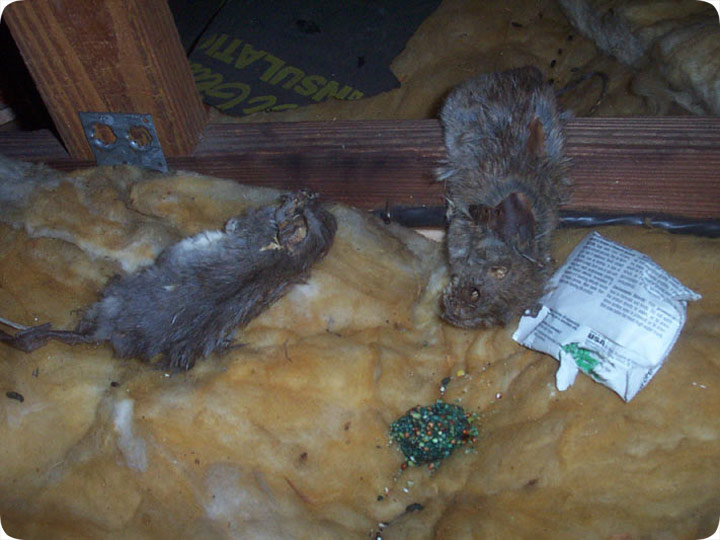-
info@aaanimalcontrol.com
Call us for help in your town
Humane Wildlife Education
Rat Poison Is a Bad Idea

Poison is ineffective - Yes, poison does kill rats. But it does not kill all of the rats. Only 100% eradication is acceptable in rat control. If you leave just a few, your problem is just as bad as it ever was, because rats reproduce so quickly. The thing about poison is that not all the rats will eat it, and of those that eat it, not all will die. You'll still have survivor rats, and more and more rats will replace the ones that do die. You'll have to keep applying poison, and it's a never-ending cycle.
Poison is lazy - By this I mean that most of the companies or people that choose to use poison as a solution for rat control are of the mindset of "I want a quick and easy fix to the problem", when in fact rat control is not necessarily easy. The only way to solve a rat problem permanently is to do some work - inspect the home and find out how the rats got in, and perform exclusion repairs that will keep the rats out forever. People that tend to use poison just throw some poison in the attic and never work on really solving the problem.
Poison is a temporary fix - The extermination companies that use poison don't want to solve your rat problem. They want to sign you up for a never-ending monthly or quarterly contract, and bill you for life. If they solve your rat problem, they lose you as a customer. They know that poison just kills some of the rats, and that you'll keep calling and calling, because you still have a rat problem.
Poison leave stinking rotting rat carcasses - This is probably the biggest problem with poison. The rats that die will die somewhere in your attic or walls, and when they do, the smell is terrible. Believe me, I know, I've been in the trenches for years. Almost every day of my life I get called to a home with a terrible odor in it, because an animal has died somewhere inside the structure. Most of the time, it's one or more dead rats (which smell putrid), and they've died from poison. Such was the case in the above photo. The house smelled horrific. I found several dead rats, along with rat poison, in the attic. The people that set rat poison always use the same line: "The poisoned rats get thirsty and go outside to drink, and then die at the water source". That is a lie, and nowhere on any rodenticide or rat poison will you ever see that claim made in writing. The rats will die wherever they happen to be when the poison kills them, and most of the time, that means inside your house.
Poison is inhumane - You may or may not care, but poison is by far the least humane way to deal with any animal problem. The animals suffer as they die of internal bleeding and hemorrhaging. And many times, people set rat poison and other animals, such as squirrels, opossums, raccoons, or even dogs eat it, and then they suffer. It's a bad idea to put poison out into the environment. A snap trap is a far more humane way to kill a rat, at least it's an instant death. Live cage traps are also humane, but only if checked very frequently, so the rat does not die of dehydration or heat stroke.
What's a better route? - Of course the better approach is to seal off all the entry points into the home, then trap and remove the remaining rats with snap traps. This is the professional way, the way that works and provides permanent results. Poisoning is absolutely ignorant, reckless, heartless, and stupid.
Do it yourself: Visit my How To Get Rid of Rats page for tips and advice.
Get professional help: Visit my Nationwide Pro Directory of wildlife removal experts.
For more wildlife stories, click my Wildlife Blog or click my below banner to hire a local trapper.





















